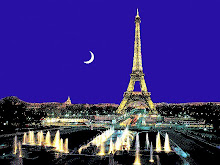Benjamin Franklin
Labels :
Benjamin Franklin,
Paris 16
We continue with our walk trough the 16th arrondissement, this time just south of Trocadéro and more or less just in front of where is the Eiffel Tower, on the opposite side of the Seine River. This area is called Passy and was a separate village until 1860.
 I’m not going to tell the story of Benjamin Franklin (1706-1790) here, but only what is more related to him and to France and more particularly to this area.
I’m not going to tell the story of Benjamin Franklin (1706-1790) here, but only what is more related to him and to France and more particularly to this area.
 Franklin spent almost ten years here, arriving in 1777. He lived just behind the reddish small “hôtel” that you can see in the middle of the painting. Everything looks today different, only the small “hôtel” is still there (today the Turkish Embassy). Together with other members of the American delegation, sent to France to negotiate peace with Great Britain, Franklin was invited to live in a castle-like building, now disappeared, at the expense if a rich pro-American French aristocrat, Le Ray de Chaumont.
Franklin spent almost ten years here, arriving in 1777. He lived just behind the reddish small “hôtel” that you can see in the middle of the painting. Everything looks today different, only the small “hôtel” is still there (today the Turkish Embassy). Together with other members of the American delegation, sent to France to negotiate peace with Great Britain, Franklin was invited to live in a castle-like building, now disappeared, at the expense if a rich pro-American French aristocrat, Le Ray de Chaumont.
Franklin was already well known and extremely popular in France (which he had visited before). On his way from Nantes (where his ship arrived) to Paris, crowds lined the roads to acclaim him. He was as popular when he finally left – he even got a street named after him already in 1791. In the meantime, Franklin, acting as American ambassador, had achieved that the Treaty of Paris was signed in 1783, leading to freedom from Great Britain. He and his colleagues obtained by the way so much from France in money and arms that the country almost got ruined, one of the major reasons to the French Revolution a few years later.
I have only two photos to show you today: The building you see has a medallion and an inscription indicating that this was the place where Franklin lived and also that it was the first place in France where a lightning rod was installed. The lightning rod was of course invented by Franklin, as were the bifocals (not yet the progressive version), the Franklin stove, the catheter… He discovered the existence of the Gulf Stream, he proposed a central governing council for Europe, the daylight saving time… and, among many other things, he was a great statesman!
The lightning rod was of course invented by Franklin, as were the bifocals (not yet the progressive version), the Franklin stove, the catheter… He discovered the existence of the Gulf Stream, he proposed a central governing council for Europe, the daylight saving time… and, among many other things, he was a great statesman!
 I’m not going to tell the story of Benjamin Franklin (1706-1790) here, but only what is more related to him and to France and more particularly to this area.
I’m not going to tell the story of Benjamin Franklin (1706-1790) here, but only what is more related to him and to France and more particularly to this area. Franklin spent almost ten years here, arriving in 1777. He lived just behind the reddish small “hôtel” that you can see in the middle of the painting. Everything looks today different, only the small “hôtel” is still there (today the Turkish Embassy). Together with other members of the American delegation, sent to France to negotiate peace with Great Britain, Franklin was invited to live in a castle-like building, now disappeared, at the expense if a rich pro-American French aristocrat, Le Ray de Chaumont.
Franklin spent almost ten years here, arriving in 1777. He lived just behind the reddish small “hôtel” that you can see in the middle of the painting. Everything looks today different, only the small “hôtel” is still there (today the Turkish Embassy). Together with other members of the American delegation, sent to France to negotiate peace with Great Britain, Franklin was invited to live in a castle-like building, now disappeared, at the expense if a rich pro-American French aristocrat, Le Ray de Chaumont.Franklin was already well known and extremely popular in France (which he had visited before). On his way from Nantes (where his ship arrived) to Paris, crowds lined the roads to acclaim him. He was as popular when he finally left – he even got a street named after him already in 1791. In the meantime, Franklin, acting as American ambassador, had achieved that the Treaty of Paris was signed in 1783, leading to freedom from Great Britain. He and his colleagues obtained by the way so much from France in money and arms that the country almost got ruined, one of the major reasons to the French Revolution a few years later.
I have only two photos to show you today: The building you see has a medallion and an inscription indicating that this was the place where Franklin lived and also that it was the first place in France where a lightning rod was installed.
 The lightning rod was of course invented by Franklin, as were the bifocals (not yet the progressive version), the Franklin stove, the catheter… He discovered the existence of the Gulf Stream, he proposed a central governing council for Europe, the daylight saving time… and, among many other things, he was a great statesman!
The lightning rod was of course invented by Franklin, as were the bifocals (not yet the progressive version), the Franklin stove, the catheter… He discovered the existence of the Gulf Stream, he proposed a central governing council for Europe, the daylight saving time… and, among many other things, he was a great statesman!












27 comments:
He was a great statesman indeed and you've taught me a little more than I knew before. Thank you, Peter, for the lesson and the beautiful scenes today.
He was a great statesman indeed and you've taught me a little more than I knew before. Thank you, Peter, for the lesson and the beautiful scenes today.
Hi Peter,
I've sent u an email. Did u get it?
my friends must be in France by now, so jealous of them..
hmm, so when are you coming to KL?
He was also a very smart man! And you are a thorough historian. And an educator! I've been learning a good deal from you.
very educational ... tq :-)
tu pourrais faire aussi la rentrée scolaire, tellement tu nous apprends des choses. Bon souvent je coule dans ton anglais (comme beaucoup de Français, je ne suis pas tres doue pour les langues ;o) ).
Ne sachant pas dormir,je viens prendre ma leçon d'histoire du jour. J'en apprends encore beaucoup, je ne connaissais de Benjamin Franklin que le paratonnerre et je ne savais pas non plus qu'il avait vécu à Paris.
Encore une journée enrichie grâce à toi.
WOW! De PAssy je connaissais tout à fait autre chose, le quartier où faire des courses surtout.
"He and his colleagues obtained by the way so much from France in money and arms that the country almost got ruined, one of the major reasons to the French Revolution a few years later."
je pense que là tu vas un peu loin. Il y eut sans doute bien d'autres raisons à la révolution que l'aide aux américains.
Oh la la, j'ai beaucoup de retard moi! Heureusement qu'il n'y a pas d'interro! J'ai notamment beaucoup apprécié tes recherches sur Guimard ou l'art de la courbe.
Et bravo pour toutes les récompenses que tu as reçues!
lasiate wonders whether you really can state that the help to the Americans was a major reason... etc.
It's clear that the econimic situation in France was catastrophic those years and that this was a clear reason to general discontent in the country - and the "American part" of the budget was very high. Additionally, the money did not enter (bad harvests etc...).
Of course, the French gave their help, not only to help the Americans, but also to ennoy the British!
I believe that I'm not the only one to believe that the help to the Americans was ONE of the major reasons for the catastrophic economic situation and that this was ONE of the major reasons for the revolution to come. Many other elements played of course also.
Franklin was, as you know, something of a ladies man. He was also a man before his time. I recently read a new book about him that I found fascinating. Your post today touches on many different aspects of his life and times.
I've enjoyed this history lesson Peter :D Thank you.
Interesting history lesson. I didn't know he lived in Paris for 10 years. Amazing.
Bonsoir Peter, j'ai tellement de choses à faire la journée que maintenant je passerai peut-être plus souvent en soirée, mais je ne vous oublie pas. J'ai appris plein de choses sur Monsieur Benjamin, homme d'exception, s'il l'on peut dire. Je ne connais pas le quartier de Passy par contre je connais une prof qui porte comme nom de famille Passy. Peut-être que son nom de famille est lié au nom du quartier. A voir.
Je vais me préparer à manger gentiment et me poser telle une larve devant la TV. Comme beaucoup de gens je pense. Je vous embrasse!
oldmanlincoln:
Yes, I guess he was something of a ladies' man, but obviously a gentleman!
delphinium:
Je n'ai pas trouvé l'origine du nom pour ce village de Passy, mais je crois qu'on trouve beaucoup de communes en France avec ce nom.
Another excellent post, Peter!
heather:
Thanks! ... and thanks for revisiting!
I love the buildings...wonder if the lightening rod has worked over the years?
Ben alors comme d'hab c'est les amerloques qu'ont tout inventé même s'ils passent leur temps en France (l'avion, le cinéma, la photo...)
what a great narration..another side to him..brilliant!
neva:
The building is not the same and I'm afraid that the rod was changed as well!
cergie:
Souvent les français ont inventé, mais ce sont d'autres (surtout les américains) qui ont commercialisé (photo, cinéma...).
black feline:
I believe that Franklin was brilliant!
Oh, sure, blame us for the French Revolution ;-)
wut an interesting post on this great man.
U alwys tell the best of stories.
Keshi.
isabella:
Maybe, but I guess that the French are proud of having contributed to the American independance - and for having annoyed the British of course!
keshi:
Thanks!
Post a Comment